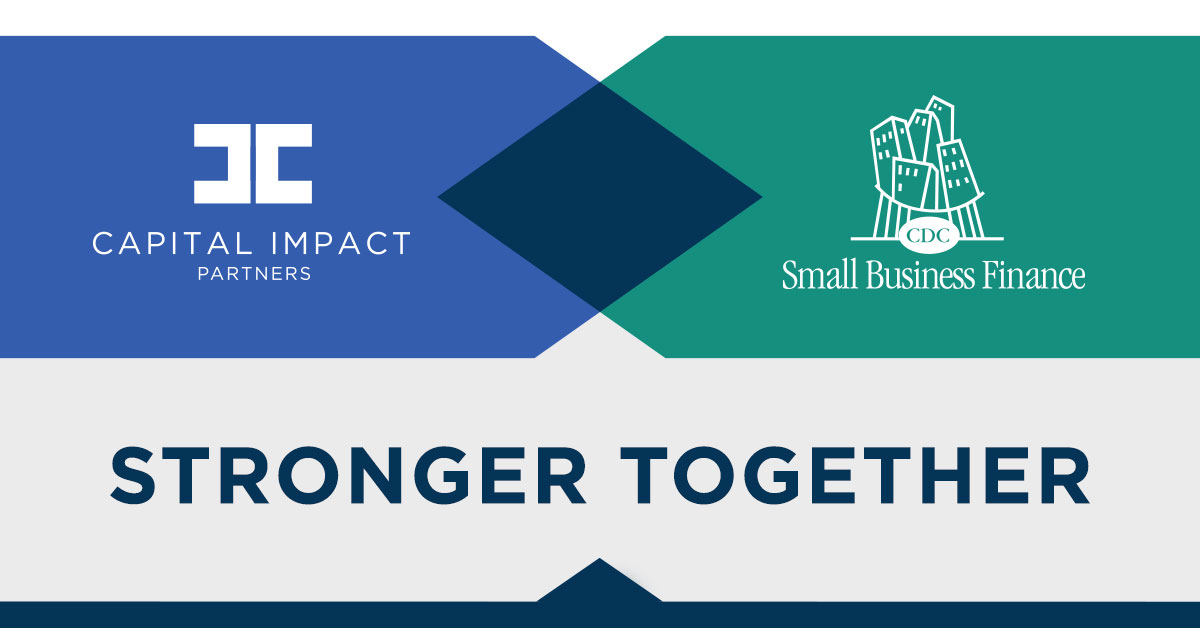We are excited to announce that Capital Impact Partners and CDC Small Business Finance are formally coming together to launch a transformative new enterprise and innovate how capital and investments flow into historically disinvested communities to advance economic empowerment and equitable wealth creation.
Leveraging our 80 years of experience, nearly $3 billion in assets, and strong ties to both large financial institutions and community-based organizations, Capital Impact Partners, and CDC Small Business Finance, the nation’s leading mission-based small business lender are now operating as one under Capital Impact’s current President and Chief Executive Officer Ellis Carr.
Kurt Chilcott will transition from President and CEO of CDC Small Business Finance and continue his support of this vision by serving as Board Chair of both Capital Impact Partners and CDC Small Business Finance.
Ellis will manage the new enterprise under one national strategy designed to drive a holistic place-based approach to community and economic development at scale, centered around people and place, to address key systemic issues that communities face:
- Growth of Economic Inequity: Current financial structures do not provide equitable opportunities or outcomes as the racial wealth gap grows;
- Lack of Place-Based, Community-Led Solutions: Trusted organizations that listen to and value community-led solutions, and offer relevant place-based lending and investment products and services are currently lacking.
- Disconnected Supply & Demand of Capital: Institutional investors and community organizations are currently disconnected from efficiently leveraging the supply and demand of capital investments to drive real and scalable impact.
The Moment Is Now for Systems Change
This unusual coming together between leaders in the CDFI and small business sectors is driven by the need to shake-up the traditional tools and approaches that have failed to address systemic issues of inequality, economic empowerment, and the widening racial wealth gap.
The opportunity is enormous. Research looking at the economic cost of Black inequality indicates that aggregate economic output would have been $16 trillion higher since 2000 if racial gaps had been closed. If we close gaps today, the equivalent add to the U.S. economy over the next five years could be $5 trillion of additional GDP.
At the same time, a report by US SIF: The Forum for Sustainable and Responsible Investment shows that total U.S. assets under management applying various environmental, social, and governance (ESG) criteria grew from $12 trillion at the start of 2018 to $17.1 trillion at the start of 2020, an increase of 42 percent. On the demand, the mission-driven financial advisory firm Next Street finds that there is an estimated $4.5 trillion of investment needed in emerging community and economic development opportunities across housing, education, health care, food, small business, and adjacent sectors.
Combined Strengths and Values Bring Tailored, Unique Opportunities
Capital Impact and CDC Small Business Finance announced the beginning of their combined efforts in August 2020 with the decision to launch three pilot projects in Los Angeles, Detroit, and the Washington, D.C Metropolitan area. Lessons learned through that ongoing work have informed the broader strategy for aligning as a single team to advance high-touch solutions at scale and ensure that traditional and mainstream financial systems are equitably serving Black, Hispanic, and Indigenous communities.
With strong ties to both large financial institutions and community-based organizations, experience delivering a full suite of products and services, and an established position as advocates in Washington, D.C., the new operating model is uniquely suited to unleash solutions for communities that will break down longtime barriers to success.
Continued Commitment to Small Business, Commercial Real Estate and Facilities Lending
As this strategy evolves, all current, ongoing work by CDC Small Business and Capital Impact Partners will continue unchanged, including CDC Small Business Finance’s working capital lending along with its SBA 504 commercial real estate lending in California, Arizona, and Nevada, as well as Capital Impact’s lending to Federally Qualified Health Centers, affordable housing developments, charter schools, and healthy food retailers.
The organizations will continue to identify and address specific issues in disinvested communities at the state, county, and local levels. This includes targeted lending products, capacity-building programs, and investment capital strategically customized to address high-priority local issues.
To learn more about how you can join this effort, please visit www.investedincommunities.org








